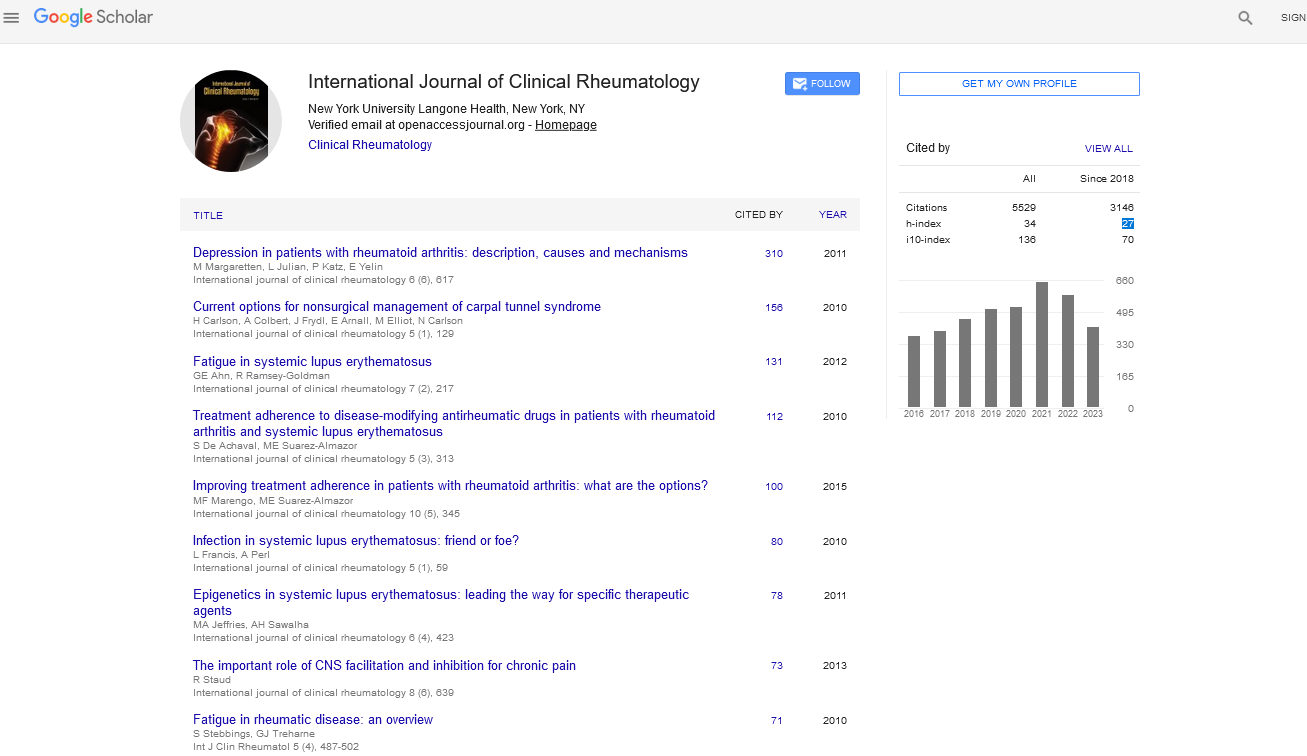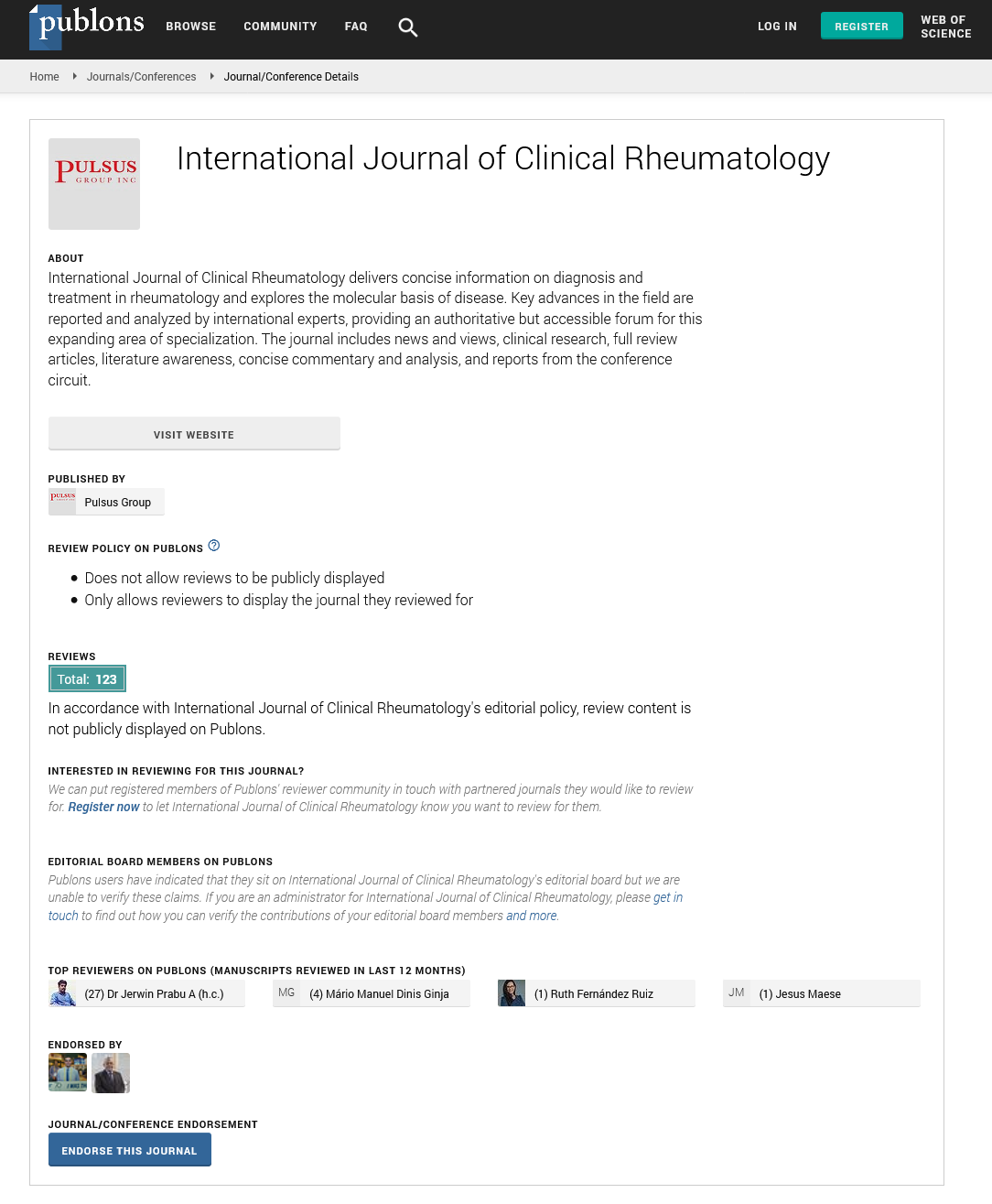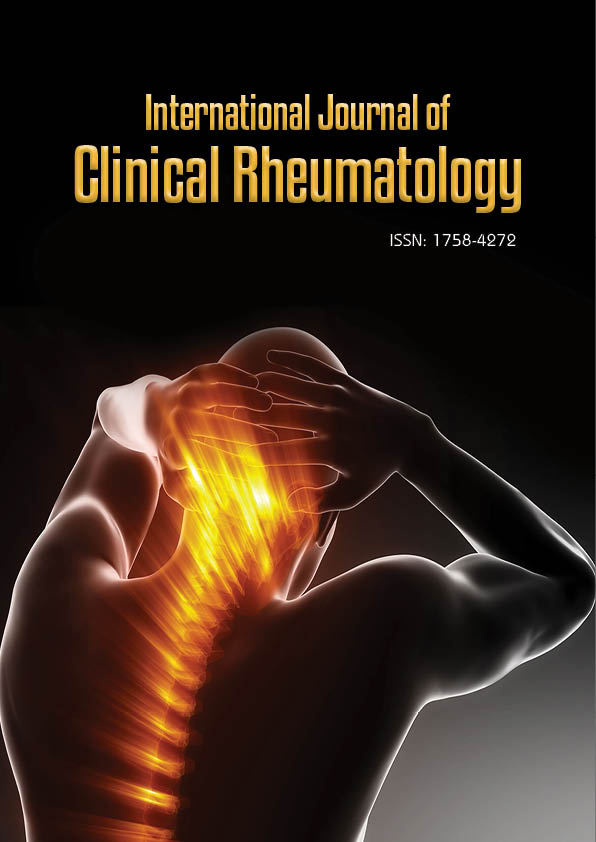Short Communication - International Journal of Clinical Rheumatology (2023) Volume 18, Issue 3
Switching among rheumatologists' perceptions of non-medical tradition and biosimilar biologics
Mohammed A Omair*
Department of Medicine, Rheumatology Unit, King Saud University, Riyadh, Saudi Arabia
Department of Medicine, Rheumatology Unit, King Saud University, Riyadh, Saudi Arabia
E-mail: Omair_ma@Md.co.sa
Received: 28-Feb-2023, Manuscript No. Fmijcr-23-91739; Editor assigned: 02- Mar-2023, Pre-QC No. Fmijcr-23-91739 (PQ); Reviewed: 15-Mar-2023, QC No. Fmijcr-23-91739; Revised: 20-Mar- 2023, Manuscript No. Fmijcr-23-91739 (R); Published: 25-Mar-2023, DOI: 10.37532/1758-4272.2023.18 (3).48-50
Abstract
Background The end of this study was to estimate rheumatologists’ comprehensions of biosimilar biologics and on-Medical Switching (NMS). Methods Across-sectional check was conducted among listed members of the Saudi Society for Rheumatology. The questionnaire concentrated on biosimilars and NMS. Logistic retrogression was performed to ascertain the effect of demographics and practice characteristics on the use of biosimilars and NMS. Results Out of 249 SSR members, 143 completed the check, generating a response rate of57.4. Of those (59.44) were men with a mean (± SD) age and times of practice of42.3 ±9.13 and10.3 ±8.9, independently. Rheumatologists managing adult cases (81.82) and Ministry of Health practice (43.36) were the maturity of repliers. Former experience in defining a biosimilar was reported by 43(30.07) actors, with a advanced probability among women (p = 0.015). An aggregate of 26(18.18) actors had performed NMS on eligible cases. Acceptable knowledge on biosimilars was reported by 69(48.25) actors. The acceptability of substantiation to grant biosimilar blessing for the studied suggestion and extrapolation to treat other conditions was reported by 88(61.5) and 69(48.3), independently. The conception of summation- of- the- substantiation was well understood by37.1. Biosimilars had been preliminarily used by 43(30.07) actors in their practice. NMS had been tried by 26(18.18), while 86(60.1) actors believed that NMS might harm cases. Conclusion There's a clear knowledge gap about the biosimilar blessing process among adult and pediatric rheumatologists who took part in the check. In addition, a large number of actors reported having negative opinions about NMS. There's a need to organize SSR- led educational conditioning, and develop public guidelines regarding biosimilars and NMS
Keywords
Biosimilars • Non-medical switching• Rheumatoid arthritis• Saudi Arabia
Introduction
Rheumatic conditions are associated with a significant burden on cases and the community in Saudi Arabia. Biologics have led to a dramatic enhancement in the long- term issues of cases with rheumatic conditions; still, this has come with an increase in direct costs to health care systems. The preface of biosimilars to the clinical practice of rheumatology has led to significant cost savings and bettered access to treatment with biologics in numerous countries. Different situations of uptake regarding biosimilars have been observed worldwide. This could be related to profitable pressures, diversity of nonsupervisory procedures, and differences in strategies on how to introduce biosimilars into health systems. All of these factors apply to the Middle East region; which faces numerous healthcare- related challenges, and has been shown to have a varying acceptance of biosimilars. Due to a lack of public guidelines, the situations of understanding and use of biosimilars in Saudi Arabia are low, and need to be addressed. Rheumatologists are important stakeholders who play a critical part in easing biosimilar uptake. When switching from a familiar birth remedy to a biosimilar remedy is accepted, acceptable communication with cases and caregivers, assessment of the durability of medical care and verification of the development of adverse events are main support tasks that need to be completed. former studies in other countries have uncovered some enterprises and issues regarding the use of biosimilars that are primarily the result of an deficient understanding of biosimilar manufacturing and blessing processes. The main obstacles to complete understanding that have been reported are as follows 1) appreciation of the conception, summation- of- the substantiation; 2) extrapolation to all approved suggestions grounded on successful clinical trials in a model complaint; and 3) shy long- term safety and efficacity data [1, 2].
Methodology
This design was launched at a meeting of the CSG in May, 2019, and continued until November, 2020. The CSG is a public expert group of clinicians, clinical academics, multidisciplinary AHPs, nurses, clinical psychologists, and druggists. The CSG has strong consumer representation, supporting the development and conduct of a comprehensive portfolio of clinical studies and clinical trials in the field of paediatric rheumatology. Further information on the structure of the CSG, including content-specific groups, the functional group, and the steering group are in the excursus (p 4). All members of the CSG (health- care professionals and consumers) formed the design steering group, which was responsible for identification of interested parties to be consulted when soliciting exploration ideas (panel). The steering group also supported with the process of gathering exploration precedence ideas [3, 4]. The functional group oversaw all stages of the design and included the CSGco-chairs, the CSG trainee representative, a clinical academic foundation trainee, the CSG director, and an external expert in agreement decision timber and exploration precedence setting. The process of relating and managing the exploration precedence ideas is outlined in the figure. The CSG consumer representatives gathered exploration ideas from cases with paediatric rheumatic complaint, their parents or caregivers, and other individualities or groups affected by paediatric rheumatic conditions (eg, siblings of cases, charities). Ideas were collected using an online check distributed to UK consumer organisations, societies, and charities (panel). The check questions were written by the consumers in the CSG to insure that they were extensively understood with applicable lay language (excursus p 2). A resemblant process to gather ideas for exploration precedences from health- care professionals involved in- person meetings, virtual meetings, or online checks distributed to the professional groups described in the panel [5, 6].
Discussion
This check is an important action that provides information to guide the SSR in designing educational conditioning and propagating unprejudiced information about biosimilars. Prior to the blessing of biosimilars in Saudi Arabia in 2015, we conducted a check on rheumatoid arthritis (RA) treatment strategies. Of the 54 actors in that study, 26.3 used biosimilars previous to originators whereas in the current study, we showed that about 60 of repliers indicated they're presently ready to start using biosimilars for treatment. We also conducted a study on Arab rheumatologists during a indigenous meeting held in 2018 and set up that only 30 of actors expressed that they were moreover surely or largely likely to define a biosimilar to an eligible case [7, 8].
The timing of this study, during the COVID- 19 epidemic, is associated with increased profitable pressure on the healthcare system and a deficit of specifics. This might impacted the responses of actors. There's presently an adding demand for biosimilars, especially with the profitable impact of COVID- 19 that has affected the medical force chain across the world. This has led to medicine dearths, which in turn may dictate the development of guidelines on the use of biosimilars and NMS.
In conclusion, this action has linked critical knowledge gaps regarding the biosimilar blessing process and other walls that probably affect their use by rheumatologists in Saudi Arabia. It also linked negative views on NMS, which should be the target of unborn educational conditioning [9, 10].
Conflict of Interest
None
Acknowledgment
None
References
- Castro Corredor D, Cuadra Díaz JL, Mateos Rodríguez JJ et al. Self-management model in the scheduling of successive appointments in rheumatology. Reumatol Clin (Engl Ed). 15, 333-337 (2019).
- Connolly CM, Plomp L, Paik JJ et al. Possible future avenues for myositis therapeutics: DM, IMNM and IBM. Best Pract Res Clin Rheumatol. 36, 101762 (2022).
- Ike RW Diagnostic arthroscopy. Baillieres Clin Rheumatol. 10, 495-517 (1996).
- Mathiessen A, Cimmino MA, Hammer HB et al. (2016) Imaging of osteoarthritis (OA): What is new? Best Pract Res Clin Rheumatol. 30, 653-669 (2016).
- Romero-Bueno F, Rodríguez-Nieto MJ, Naredo E et al. (2021) Education and Use of Lung Ultrasound in Rheumatology and Pneumology in Spain: A SER-SEPAR Survey. Reumatol Clin (Engl Ed). 22, S1699-258X 30239-4 (2021).
- Kisilevsky R, Young ID. Pathogenesis of amyloidosis. Baillieres Clin Rheumatol. 8, 613-626 (1994).
- Calin A. Radiology and spondylarthritis. Baillieres Clin Rheumatol. 10, 455-476 (1996).
- Cuevas-Orta E, Pedro-Martínez ÁJ, Ramírez-Rodríguez C et al. Homologies and heterogeneity between Rheumatology Congresses: Mexican, American College of Rheumatology and European League Against Rheumatism. Reumatol Clin (Engl Ed). 16, 87-91 (2020).
- Braun J, Bollow M, Sieper J et al. Radiologic diagnosis and pathology of the spondyloarthropathies. Rheum Dis Clin North Am. 24, 697-735 (1998).
- Hay EM. Systemic lupus erythematosus. Baillieres Clin Rheumatol. 9, 437-470 (1995).
Indexed at, Google Scholar, Crossref
Indexed at, Google Scholar, Crossref
Indexed at, Google Scholar, Crossref
Indexed at, Google Scholar, Crossref
Indexed at, Google Scholar, Crossref
Indexed at, Google Scholar, Crossref
Indexed at, Google Scholar, Crossref
Indexed at, Google Scholar, Crossref
Indexed at, Google Scholar, Crossref


